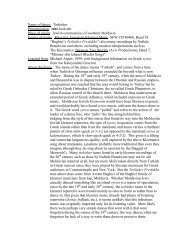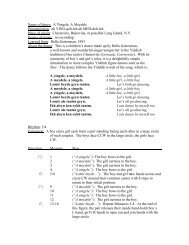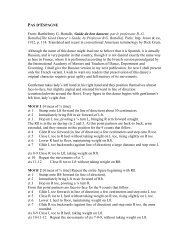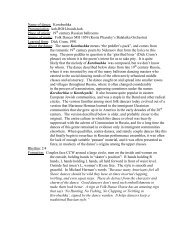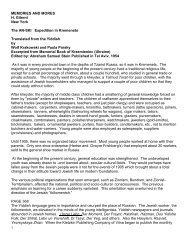Czyzewo - Helen's Yiddish Dance Page
Czyzewo - Helen's Yiddish Dance Page
Czyzewo - Helen's Yiddish Dance Page
Create successful ePaper yourself
Turn your PDF publications into a flip-book with our unique Google optimized e-Paper software.
CZYZEWO KLEZMORIM<br />
by Avraham Yosef Ritholtz / New York<br />
Excerpted from:<br />
<strong>Czyzewo</strong> Memorial Book<br />
(Czyzew, Poland)<br />
Edited by Szymon Kanc<br />
Published in Tel Aviv,<br />
former residents of <strong>Czyzewo</strong> in Israel and the USA, 1961<br />
<strong>Page</strong>s 579-585<br />
Translated by Wolf Krakowski<br />
I am a grand-nephew from the Ritholtz klezmer family in <strong>Czyzewo</strong> (TSHIZSHEVE). If memory serves, I -<br />
as a boy, would lead my grandfather, Reb Gedalye the klezmer (may he rest in peace) to the house of<br />
study for his prayers on Shabes during his old age.<br />
For this opportunity it is worth noting, that from our family, I was the first and perhaps the only one in<br />
<strong>Czyzewo</strong> that was worthy to carry the family name -- Ritholtz. This was during the years of the first World<br />
War, 1914 - 1918. Up until that time, I was also not excluded, as was the custom in other towns, from<br />
being called by one's father's, grandfather's, father-in-law's, or mother-in-law's name and even by one's<br />
wife's name and by one's trade.<br />
And so my grandfather, may he rest in peace, was called Gedalye the klezmer. My father, may he rest in<br />
peace, Itzl the klezmer and I were known under the name: Avraham-Yosef-Itzl the klezmers.<br />
To the Christains I was known as "Gedaltshik," according to my grandfather's name.<br />
Unaware as to exactly how my grandfather, father and nearly the entire family actually made their living<br />
from repairing watches, they were called "klezmer."<br />
Even though since childhood I used to help my father make his klezmer income, later, with my own<br />
efforts, I acquired real knowledge of the art of music, which I always used for social purposes. However,<br />
when organizing and presenting a <strong>Yiddish</strong> theatre orchestra and gathering, I was not referred to by the<br />
title "klezmer."<br />
Maybe it was because it was not the source of my livelihood.<br />
My grandfather left behind four sons and a daughter, all of whom occupied themselves with klezmer<br />
music.<br />
Playing music did not even provide enough for a dry crust of bread and, since every family had several<br />
small children, each one actually had another income on the side.<br />
My grandmother used to sell home-made cookies at fairs and markets.<br />
My father and uncles occupied themselves with repairing watches.<br />
But our town and community was too small to support this large watch-repairing family so, over time, we<br />
went hungry.<br />
Not having any other way out, music-making kept the family from going under.<br />
1
Velvl, the oldest of the brothers, moved to Tshekhanovtse and there, with his children, established a<br />
band.<br />
Aaron, the youngest, went to Zembrove and he also established an orchestra comprised of his own and<br />
hired people.<br />
My father and his brother Yidl both remained in <strong>Czyzewo</strong> and occupied themselves with both trades<br />
(music-making and watch-repair) which bought in just enough for their families to remain hungry most<br />
days of the week, until my uncle Yidl went off to America.<br />
My father remained in <strong>Czyzewo</strong>, established a band and was, for many years, the town's only watchrepairman.<br />
The ensemble comprised the following people: my uncle Itzl, first violin; Yitzkhakl the klezmer, second<br />
violin; Yitzkhakl's brother Melekh and my older brother Aaron David, trumpet and arranger and<br />
clarinet and flute; Aaron Leybl and Itche (both deliverymen) were bass-players and Yosl Daniels (sp)<br />
played the drums.<br />
Years later, the size of the orchestra was diminished. There remained only the two violinists and I helped<br />
out on clarinet. Drummers were unemployed young men, volunteers.<br />
In their heyday, the much-in-demand orchestra played at local weddings and sometimes at other<br />
celebrations in nearby towns like Yendzsheve, Zaramb or Sokole. Even at nearby Christian nobles'<br />
courtyards and rural at Christian weddings.<br />
It often happened that a mother-in-law from a nearby town or countryside, for various reasons forgot to<br />
send a wagon to transport the klezmers. The entire orchestra would go on foot. The wages earned for<br />
playing were not enough to cover the rental of a small wagon.<br />
At balls where we required a larger orchestra, we hired musicians from other towns, including Bialystock.<br />
Concerning these special events at rural weddings and balls, which were both comical and serious, I will<br />
relate two episodes.<br />
The first episode shows that, for all his simplicity my father possessed the strength to "conquer his<br />
desires."<br />
It happened in the nearby town of Sudki.<br />
On a beautiful summer Sunday afternoon, we were brought to a courtyard to play at a ball under the open<br />
sky. Between flowery rows, richly-covered tables were laden with fruit, candy, expensive chocolate and<br />
bon-bons. Various liquors. Separate tables laden with several smoked and roasted meats that strongly<br />
tore at our hungry appetites. It took our breath away.<br />
The serving staff knew that Jews did not eat at the same table with Christians. They asked us if they<br />
should prepare a separate table for us. Not waiting for my father, who had gone somewhere to daven<br />
minkhe (say his afternoon prayers), we all agreed to the proposal.<br />
But when we were seated around the table laden with appetizers, fried in butter and other tasty meats, it<br />
was soon time to prepare for AKHILE and suddenly the door flew open and there stood my father.<br />
It is hard to say how long the silence lasted and for how long we sat motionless from fear. All of a<br />
sudden, my father began to yell with superhuman power:<br />
“We have to leave! Goyim, treyfnyake (eaters of non-kosher food)!<br />
2
You devour treyf (unclean food)? Get out ! Get out!”<br />
The band quickly dispersed. Jumped through the window, and . . . we had to make do with bread and<br />
butter, hard-boiled eggs and tea that my father had prepared beforehand, while we sat around the treyf<br />
table.<br />
It never entered any of our minds to rebel against my father's handling of the situation.<br />
For forty years my father was a klezmer musician in <strong>Czyzewo</strong>. But because of the anti-Semitism that<br />
developed in Poland during the anti-Semitic agitations, which were carried out especially in the <strong>Czyzewo</strong><br />
area, Jewish klezmers were no longer hired to play at Christian balls.<br />
. . .<br />
The story that I will tell you, was told to me by my father when I was still a child. Even though I am not a<br />
believer in the supernatural, I will recall it nevertheless, because the seriousness with which my father<br />
spoke of it engraved itself strongly upon my memory.<br />
When my grandfather was still a young man, shortly after his wedding, one Shabes evening two<br />
noblemen came into his home; they were elegantly attired and told him and his klezmers to come with<br />
them to a ball which they had planned for the evening.<br />
They mentioned the name of a village which was not familiar to my grandfather. He agreed and called<br />
the group together. They sat down in a fine coach hitched to three horses and, after riding for half an<br />
hour, arrived in a courtyard that was already filled with guests.<br />
The musicians were led into a ballroom and couples began to dance. All of a sudden they noticed that<br />
the dancers had chicken feet! [Translator’s note: I think they could have been inbred nobility with<br />
malformed feet, a mishpokhe fayler (genetic defect). Tall tales are usually based on fact]<br />
A fright fell upon the musicians but they didn't know how to get out of the situation.<br />
They played on but were determined not to eat anything.<br />
We had to play for several hours continuously because the dancers didn't want to stop.<br />
It was close to midnight when the two noblemen who hired us, came over and said:<br />
"We are very pleased with your playing. How do you wish to be paid - with gold or with chicken s**t?"<br />
"with gold" - said my frightened grandfather.<br />
Suddenly, a mighty storm appeared. It became dark and they suddenly found themselves in mud, in the<br />
forest. The violins were hanging from the trees and they were full of dirt [Transalor’s note: chicken<br />
droppings?]. With strenuous effort, they retrieved them from the trees and barely dragged themselves<br />
home, tired and muddy.<br />
On Shabes, they all went to the house of study to daven and say goyml (prayer for the safe return from a<br />
journey).<br />
Even before the first World War, I initiated free music classes in my workshop (?), which I kept in the<br />
home of Yeshiye Gozshaltshani, and afterwards, at Peysekh Turavitch's, or as they called him, Peysekh<br />
the SOLTIS'[translator’s question:family name?)<br />
3
The most able of the participants were:<br />
Shmulke Vengozsh, who was killed by the Hitler gang; Mishl Litman's son, shot by the Poles; Itsche<br />
Lyubeltshik, who died in Syria; and *Yivdl Lekhayim Simkhe Gramadzin* (See Note below), who lives in<br />
America today. He took over the direction of the <strong>Yiddish</strong> theatre orchestra soon after my departure from<br />
<strong>Czyzewo</strong>.<br />
I thank my father and my great-grandfathers for their spiritual legacy and for my love of music that I<br />
maintain to this day.<br />
My father, his three brothers and sister all died at a ripe old age, in the golden land, America.<br />
***<br />
May Their Memories Be Blessed<br />
__________________________<br />
*Translator’s Note: Don't know if this is all one name or if "Yivdal Lekhayim" is some sort of "blessing" or<br />
honorific. But there is no comma between Lekhayim" and "Simkh." "Lekhayim" would be, in my<br />
experience, unusual for a name.<br />
AKHILE—we do not have a translation for this word.<br />
4



